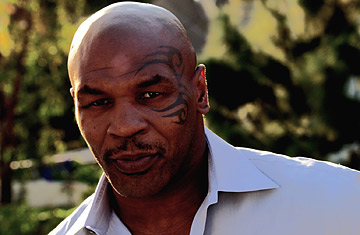
Mike Tyson, former boxing champion, in James Toback's bio-pic Tyson
(2 of 2)
As a fight phenom, what Tyson lacked in height and reach he more than made up for with an implacable mix of speed and strength. "Once in the ring," he says, "I'm God." Or a more satanic force, giving the evil eye to his adversary before a bout, then devastating him with "One, two, three punches. I'm throwin' punches in bunches." A long line of opponents surrendered to his lasered rage; they toppled like Wooden-Soldier Rockettes in the Radio City Christmas Spectacular. More than Joe Lewis or Marciano or Ali, "Iron Mike" Tyson seemed set for an uninterrupted 15-year reign.
Top of the World, Bottom of the Ocean
But how to stay hungry when you're dining on caviar, sycophancy and willing women? Everyone wanted to spend time with the champ. ("I met the President of Istanbul," he marvels.) Raised by a prostitute mother, deprived of his father figure when d'Amato died before he won the title, Tyson dreamed of creating his own family, but his marriage to actress Robin Givens — and her relating of his supposed brutalities in a joint interview with Barbara Walters — was his first sensational humiliation. The teenage celibate needed to dominate women by the dozens, the hundreds, though he says that what he really wanted in a woman was "loyalty, companionship, friendship, ferociousness." He sees himself as a selfless sexual partner: "I don't like being loved; I like loving. I have too much love to give; I don't want to accept it." That sounds more like the need to control, dominate, to set the terms for sexual combat, to be a bully in bed.
He's not so chivalrous toward the young woman whose testimony in a rape trial sent him to jail for three years: "that wretched swine of a woman, Desiree Washington." Nor does he have fond memories of manager Don King, whom he accused of stealing millions from him, and he beat up and stomped down at the Beverly Hills Hotel: "a wretched, slimy, reptilian motherf----r." Nor of the entourage a kid from the streets attracts when he becomes a rich dude with no sense of fiscal moderation: "They suck my blood and suck my blood, then sell it back to me and suck it again."
Describing the fellow inmates he sounds like a sympathetic shrink — "These people are borderline sociopaths. They deserve to be in hospitals more than prisons" — rather than a member of the fraternity. After prison he returned to the ring with facial tattoos of a Maori warrior, and images of Mao and Che on his body. But those were only emblems of the focused ferocity that used to be inside him, of the burning concentration that made him a champ.
Tyson lost his last chance at a championship when, in a rematch with Holyfield, he took a rapacious bite out of his opponent's ear. A couple years later, he ended his boxing career in the most humiliating way: not on his feet, or on his back, but on a stool, refusing to come out and fight for the seventh round against a nobody named Kevin McBride. He talks about his last year in the ring as if it were the only job he knew: "I'm just fighting to take care of the bills."
These days, professing paternal joy in his six kids, Tyson says, "I have to live on the top of the world or the bottom of the ocean, but I don't know how to live in the middle of life." Now twice the age he was when he became champ, Tyson sings the sad, familiar refrain: "old too soon, smart too late." Not too late, though, to offer a hard-won perspective on a hard-fought life, in a suavely assembled movie that could be declared the undisputed champ of sports documentaries, heavyweight class.
